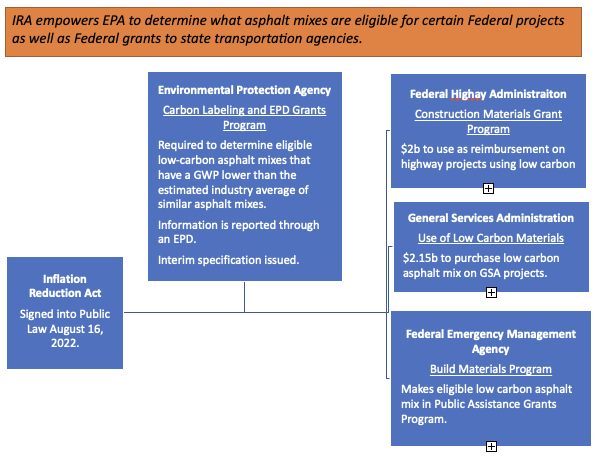Deploying clean asphalt pavement technologies to achieve net zero carbon emissions in the production and construction of highways, roads and bridges is top-of-mind in 2023 for policymakers and decision makers in Washington, DC. Low carbon asphalt mixes needs to be a top-of-mind priority – now – for asphalt manufacturers and contractors too.
As previously reported on “Takin’ Hill to the Streets,” on the heels of Congress enacting the largest public works funding bill ever, the Infrastructure Investment and Jobs Act (IIJA), the Biden Administration established the Buy Clean Task Force to advance a Buy Clean Initiative requiring the procurement of asphalt mix that has a lower carbon footprint than traditional asphalt mixes on federal and federally-funded infrastructure projects.
Inflation Reduction Act
Then last August, Congress enacted the Inflation Reduction Act (IRA) that set in motion a “whole-of-government” bureaucracy to implement President Biden’s Executive Order 14507. That proclamation requires Federal agencies to consider carbon emissions in the procurement of asphalt and other construction materials. The Buy Clean Task Force, which consists of 13 agency heads across the Federal government, is charged with ensuring the adoption of regulations and policies using the public procurement initiatives Congress provided in IRA to achieve net zero carbon emissions. These 13 agencies account for 90% of all federally financed and purchased construction materials.
The “Buy Clean” procurement initiatives Congress provided to stimulate demand for lower-carbon asphalt materials are included in three sections of IRA:
- Section 60503, which provides $2.15 billion for the General Services Administration to use to procure low carbon asphalt in projects under its jurisdiction; and
- Section 60506, which provides $2 billion for the Federal Highway Administration to reimburse or incentive state transportation agencies to use a low-carbon asphalt mix.
- Section 7006, authorizing the Federal Emergency Management Agency (FEMA) to provide financial assistance for costs associated with low-carbon materials.
Importantly, IRA authorizes the Environmental Protection Agency (EPA) to determine what low-carbon asphalt mixes would be eligible for funding under the grant programs. IRA also requires EPA to establish the requirements for using Environmental Product Declarations (EPD’s) that then can be used to set limits on the emissions’ intensity of asphalt mix that can be used by a contractor in eligible projects. IRA provides $350 million for EPA to carry out these programs.
EPA’s carbon labelling program for asphalt mix will have binding application on state transportation agencies who seek federal assistance for their highway capital construction programs. Moreover, the FHWA’s low carbon material grant program, which is likely to expand, sends an important market signal that low-carbon asphalt producers will have a competitive advantage.
EPA Issues Interim Determination for Low Carbon Asphalt
On December 22, 2022, EPA issued an “Interim Determination” preliminarily labeling asphalt that has “substantially lower levels” of embodied greenhouse gas emissions. Specifically, EPA interpreted “substantially lower” as meaning “a global warming potential (GWP) that is in the best performing 20% (Top 20%, or lowest 20% in embodied greenhouse gas emissions) when compared to similar asphalt mix. If asphalt mix in the Top 20 percent are not available in a project’s location, then an asphalt mix if its GWP is in the Top 40 percent. If the asphalt mix in the Top 40 percent are not available in a project’s location, then an asphalt mix qualifies if its GWP is better than the estimated industry average. The standard would apply to FHWA and GSA projects using IRA funding.
Furthermore, EPA says it expects GSA and FHWA will be using EPD’s as the source of determining the low carbon asphalt thresholds. Additionally, asphalt manufacturers will be required to report the supplying asphalt plant’s ENERGY STAR Energy Performance Score which EPA says will be available to asphalt producers by September 2023.
What’s Next
The EPA has issued a Request for Information (RFI) asking the public to comment on the current thresholds for “substantially lower levels” of embodied greenhouse gas emissions labeling program for asphalt. Furthermore, the EPA would like to know what it should consider in finalizing a carbon labeling program for asphalt. Comments are due by May 1, 2023.
It is expected FHWA will issue its procurement actions in the very near future.
Surface Tech will issue its comments.
Meanwhile, GSA has released a draft embodied carbon material standard for asphalt based on the EPA’s Interim Determination as follows:

A product-specific, facility specific Type III EPD will be the documentation required to ensure compliance with the new standard.
IRA also authorizes the Federal Emergency Management Agency (FEMA) to fund costs associated with low-carbon materials, “even when the costs are higher than those for conventional materials, to help cut carbon pollution, and build back cleaner and more resilient.)
In a March 21, 2023 memo to FEMA Regional Managers, FEMA defines eligible low-carbon materials as concrete, asphalt, glass and steel that have a Global Warming Potential (GWP) lower than the estimated industry averages of similar products in North America. This information will be reported through an Environmental Product Declaration (EPD).

As confusing as this may seem to those not steeped in the way agencies work in tandem in Washington, one thing is crystal clear, the largest purchaser of asphalt materials, the Federal government, is using its purchasing power to spur the deployment of low carbon asphalt mixes.
Additives, such as Surface Tech’s Aramid Reinforces Composite Asphalt (ARCA), will be key in helping asphalt manufacturers and contractors meet the goals established in these new and emerging specifications.

ABOUT THE AUTHOR
Jay Hansen joined Surface Tech following a long and distinguished career at the National Asphalt Pavement Association and in the U.S. Congress where he worked on legislation from the Intermodal Surface Transportation Act (ISTEA) in 1991, to the Infrastructure Investment and Jobs Act (IIJA) in 2021. Jay will serve as an ongoing resource for Surface Tech customers to help them get ahead of the growth curve and be ready for shifting market conditions as they occur in 2023 and beyond.

